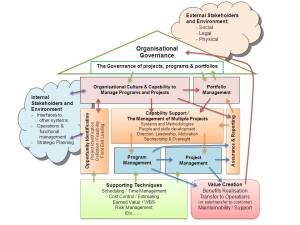 One of the clearest messages emerging from a range of sources is that ‘project management’ as defined by the PMBOK® Guide and other similar documents is simply not enough! As Professor Peter Morris has been advocating for more then a decade, organisations need to be able to effectively manage projects.
One of the clearest messages emerging from a range of sources is that ‘project management’ as defined by the PMBOK® Guide and other similar documents is simply not enough! As Professor Peter Morris has been advocating for more then a decade, organisations need to be able to effectively manage projects.
The concept of strategically managing projects describes the organisation’s ability to select, nurture and deliver the right projects and programs effectively. This includes an emphasis on the ‘front end’ of the overall process to ensure the right projects and programs are selected and initiated for the right strategic reasons and the ‘back end’ to make sure the outputs from a project are used effectively by the organisation to realise the intended benefits. Traditional ‘project (or program) management’ deals with the messy bit in the middle – delivering the required scope efficiently.
Project management skills are well defined as are some aspects of the strategic management of projects such as portfolio management and benefits management. What has still to emerge in the executive management and governance layer of an organisation’s hierarchy is an understanding of the integrated nature of the strategic management of projects. At the moment in many organisations the executives and ‘governors’ who allow their organisations to create failure after failure seem to be able to emerge unscathed by blaming the failures on lower level managers within the organisations they have created. Some of the reasons projects are ‘set up to fail’ are discussed in this post by Patrick Weaver.
From my perspective, this is a systemic failure of governance and the governing bodies should be held accountable for the destruction of stakeholder value associated with systemic project and program failures. The governing body should not be directly accountable for any specific project failure, rather for failing to develop their organisation in a way that enables the effective development of a realistic and achievable strategy, and then strategically managing the right projects and programs needed to implement the strategy. An overall framework for this type of strategic management of projects is outlined in our White Paper.
Implementing the organisational change needed to create the broad range of capabilities needed to implement the strategic management of projects requires sustained senior executive support and a group of determined, enthusiastic and resilient practitioners to develop the organisations ‘project delivery capabilities’. The biggest challenge is very few practitioners can explain what they are recommending in a language that is meaningful to executives or really understand the type of information executives need to make the best decisions.
Unfortunately complex detailed reports with dozens of RAG traffic lights and a focus on ‘time and budget’ won’t do the job. A different reporting paradigm is needed that looks at strategic alignment and the delivery of benefits to the organisation and its stakeholders. Some ideas on the best ways to effectively communicate with executives are discussed in my book Advising Upwards.
It is definitely time to move the strategic management of projects to the next level and that is firmly into the ‘C-Suites’ and board rooms of organisations. Once this is accomplished, professional project managers will be better positioned to deliver their part of the value chain effectively.

Reblogged this on A Different Perspective and commented:
We have been saying the same things for year. At times some treated us like committing a sin – how dare us saying the PMBOK is not enough.
Good read
We are are start-up delivering a solution within this new reporting paradigm, and – though complementory to systems already in place and managers all endorsing the concept – still very few adopt it. Whereas given the amount of time and money that is lost, and reputations damaged by failures, it should be a no brainer that organisations would try and invest in new ways to get into change control and more effective change. Fear for transparancy and lack of real accountability are often blocking. Which can only be solved, starting in the ‘C-Suites’ and board rooms of organisations.
Look forward to see this discussion evolves